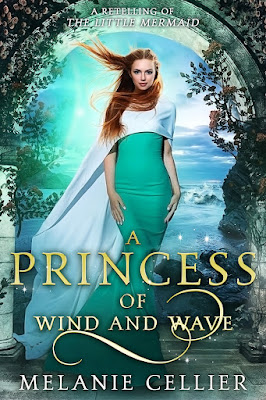Review: A Princess of Wind and Wave
Happy New Year, princesses! I concluded my 2019 with yet another of my favorite fairy tale, "The Little Mermaid." A Princess of Wind and Wave is the final book in Melanie Cellier's Beyond the Four Kingdoms series and her last book of 2019. Though it wasn't my favorite "Little Mermaid" adaptation of the year, it did focus on certain aspects of the fairy tale that other versions tend to overlook. A Captive of Wing and Feather, the previous book in the series, featured a protagonist who couldn't communicate with humans during daylight hours, which is something that would ordinarily apply more to "The Little Mermaid" than "Swan Lake." Perhaps it was for this reason that Isla does not lose her ability to speak in A Princess of Wind and Wave, making it one of the few "Little Mermaid" adaptations that does not require her to find an alternate method of communication on land such as writing or sign language. Instead, her limitations come in the form of giving up her iconic singing voice and a magical enchantment that prevents her from disclosing her true identity to humans.
Like most "Little Mermaid" protagonists, Princess Isla is not your average mermaid princess. She doesn't want to stay safe and sound in her sunken kingdom and would rather spread her fins and practice fighting alongside the palace guards in the ocean beyond the barrier. On one such adventure, she rescues a golden-haired boy from drowning and hasn't been able to stop thinking about him ever since. When her father refuses to restore their kingdom to its rightful place on land two years later, she vows never to sing again until her kingdom is safe and ventures to the surface world with her young uncle where she encounters the boy she rescued once again. After she forms a bond with Prince Teddy and his sisters, Millie and Daisy, Isla realizes that many of the things her father told her about life on the surface were exaggerated or false. Now, she must team up with her new friends to uncover the source of the conspiracy and spread the truth to her people.
This book followed the traditional format of Melanie Cellier's Four Kingdoms and Beyond the Four Kingdoms series in which a fairy tale princess must uncover a royal scandal on her kingdom and defeat the traitor before it's too late. Isla is very much your average warrior princess who knows how to defend herself but is still capable of falling in love. Unfortunately, by making her character more independent than her Hans Christian Andersen counterpart, this book significantly lowered the stakes from the original fairy tale. Instead of permanently giving up the life she knows to become human and risking everything to win Teddy's love, Isla already has the ability to shapeshift. The kingdom Merrita is unique in that it exists within a giant bubble, and everyone within it takes on human form and their lives just like ordinary people. They shift into merfolk when they cross the edge of the barrier into the ocean, but that is a journey that is only considered necessary for palace guards when they go on scouting missions, which is Isla prefers to train alongside them than take on her regular princess duties.
Above all else, "The Little Mermaid" is a cautionary tale about the tribulations of love. This book places its own spin on that as well. Isla and Teddy thought that they fell in love with each other at first sight, but it isn't until they take the time to get to know each other that they understand what true love really is. They must then cast aside the ideals that exist in their imaginations in favor of the reality that they share together. As someone who is prone to crushes on fictional characters, this is something that I relate to all too well. Real love and fantasy love are different, but the passion behind both can feel just as powerful. I liked the overall message that love takes time to grow even though it seemed a little too convenient that Isla was able to find Teddy again so easily.
A Princess of Wind and Wave was an improvement over its predecessor, A Captive of Wing and Feather, but it lacked many of the sacrifices and stakes that made the original fairy tale so alluring. It was a good princess book with a strong protagonist that fits well into Melanie Cellier's godmother-centric world. However, if you are a fan of mermaid stories seeking a new fantastical underwater kingdom to explore, the sunken island of Merrita will be sure to disappoint as it is no different from any other mainland kingdom aside from the barrier around it that leads to the ocean. I would recommend this book to anyone who enjoys Melanie Cellier's other work or stories about strong empowered princesses.
Like most "Little Mermaid" protagonists, Princess Isla is not your average mermaid princess. She doesn't want to stay safe and sound in her sunken kingdom and would rather spread her fins and practice fighting alongside the palace guards in the ocean beyond the barrier. On one such adventure, she rescues a golden-haired boy from drowning and hasn't been able to stop thinking about him ever since. When her father refuses to restore their kingdom to its rightful place on land two years later, she vows never to sing again until her kingdom is safe and ventures to the surface world with her young uncle where she encounters the boy she rescued once again. After she forms a bond with Prince Teddy and his sisters, Millie and Daisy, Isla realizes that many of the things her father told her about life on the surface were exaggerated or false. Now, she must team up with her new friends to uncover the source of the conspiracy and spread the truth to her people.
This book followed the traditional format of Melanie Cellier's Four Kingdoms and Beyond the Four Kingdoms series in which a fairy tale princess must uncover a royal scandal on her kingdom and defeat the traitor before it's too late. Isla is very much your average warrior princess who knows how to defend herself but is still capable of falling in love. Unfortunately, by making her character more independent than her Hans Christian Andersen counterpart, this book significantly lowered the stakes from the original fairy tale. Instead of permanently giving up the life she knows to become human and risking everything to win Teddy's love, Isla already has the ability to shapeshift. The kingdom Merrita is unique in that it exists within a giant bubble, and everyone within it takes on human form and their lives just like ordinary people. They shift into merfolk when they cross the edge of the barrier into the ocean, but that is a journey that is only considered necessary for palace guards when they go on scouting missions, which is Isla prefers to train alongside them than take on her regular princess duties.
Above all else, "The Little Mermaid" is a cautionary tale about the tribulations of love. This book places its own spin on that as well. Isla and Teddy thought that they fell in love with each other at first sight, but it isn't until they take the time to get to know each other that they understand what true love really is. They must then cast aside the ideals that exist in their imaginations in favor of the reality that they share together. As someone who is prone to crushes on fictional characters, this is something that I relate to all too well. Real love and fantasy love are different, but the passion behind both can feel just as powerful. I liked the overall message that love takes time to grow even though it seemed a little too convenient that Isla was able to find Teddy again so easily.
A Princess of Wind and Wave was an improvement over its predecessor, A Captive of Wing and Feather, but it lacked many of the sacrifices and stakes that made the original fairy tale so alluring. It was a good princess book with a strong protagonist that fits well into Melanie Cellier's godmother-centric world. However, if you are a fan of mermaid stories seeking a new fantastical underwater kingdom to explore, the sunken island of Merrita will be sure to disappoint as it is no different from any other mainland kingdom aside from the barrier around it that leads to the ocean. I would recommend this book to anyone who enjoys Melanie Cellier's other work or stories about strong empowered princesses.












Comments